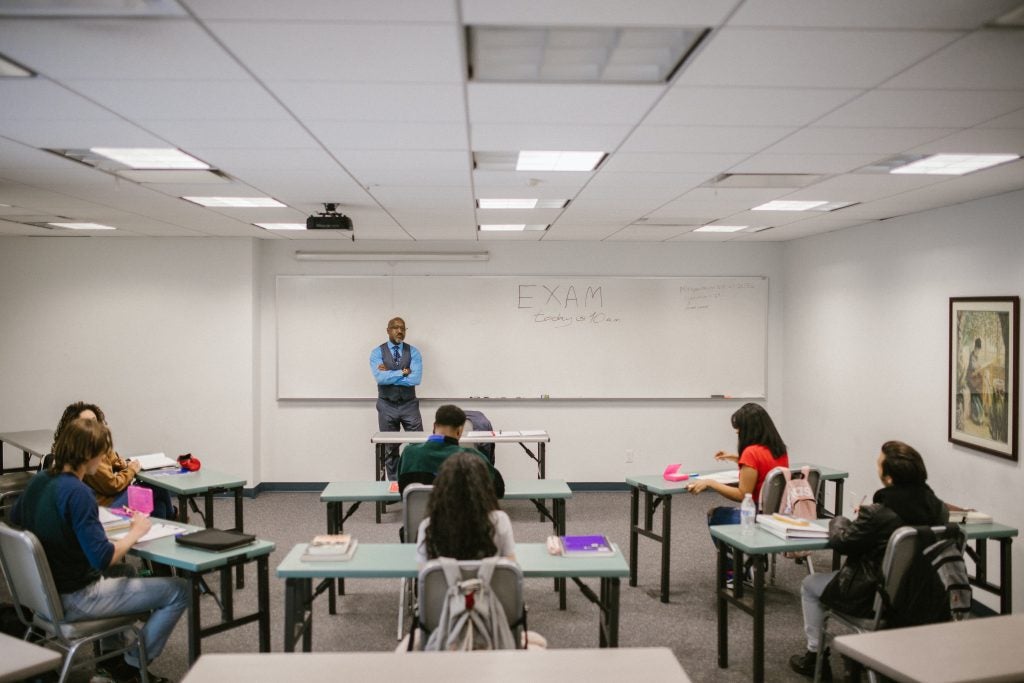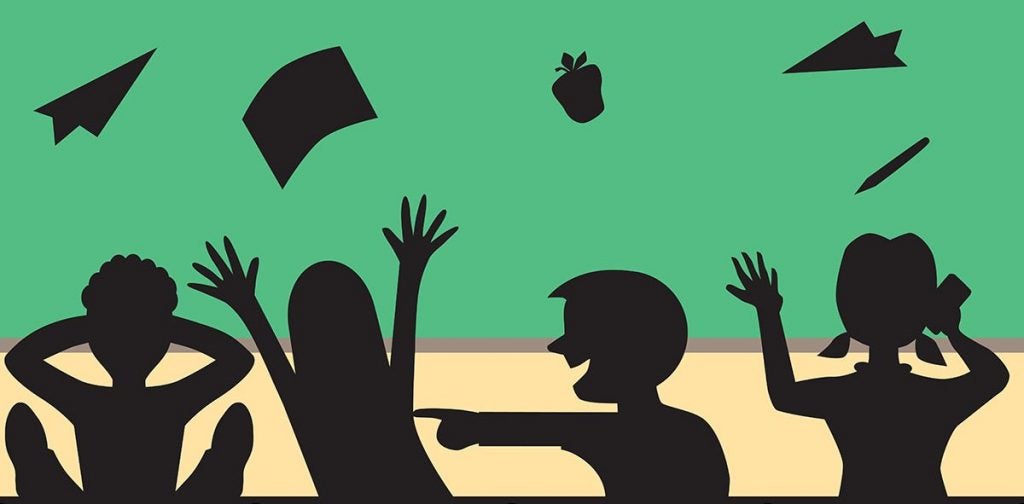Module 7: Communication (Part 3)
Classroom Behavior Expectations
Introduction
Objective: The student will identify and discuss academic disruptive behavior on a college or university campus, as well as the potential consequences for not following school behavior policies. Estimated time 30—45 minutes
Materials needed:
- Internet Access
Curriculum Link:
This section corresponds with Module 7 Lesson 2 in the College Bound Transition curriculum resources.
Learn About It
Check out this short video of a small college classroom and discuss the student’s classroom behavior with your parent/guardian.
Parents Chime In
Discuss the following questions with your student.
- What is the purpose of going to school (high school or college)?
- Did the students in the video make it possible to achieve that purpose?
- How did their behavior make the teacher feel?
- How did it make students who wanted to learn feel?
- What should a classroom look and sound like when students are ready to learn?
- How will you help create this environment in a classroom?
- A student’s behavior in the classroom communicates information about the student to other people.
- Universities set behavioral standards for the classroom to communicate their expectations to students.
- The university’s assumption is that students are at the university to learn.
- Students are paying for their university experience.
- Attending a university is a privilege, not a right.

Classroom Behavior
Parents Chime In
Expectations in college are likely to be different from what your student experienced in high school.
There will be less direct guidance. Some of the rules and guidelines will be written or explicitly presented, but others will just be part of the university culture. It is up to your student to learn and follow all of these rules, guidelines, and expectations. Professors and administrators are not responsible for explicitly teaching students how to behave properly, but they will still hold students accountable for doing so.
A general difference between high school and college underlies this issue: In high school, the assumption is that students need constant guidance to help shape and reinforce proper behaviors. In college, the assumption is that students can function reasonably well as adults without constantly being told what to do and reminded to do it.
proper behaviors. In college, the assumption is that students can function reasonably well as adults without constantly being told what to do and reminded to do it.
Students are also expected to behave with more maturity in college. Their maturity should be demonstrated by both their actions and their words.
Demonstrating respect for both professionals and peers in the university setting is a cornerstone of college-level expectations. These demonstrations of respect can take many forms, but one of the most easily observed forms is the way a student participates in academic settings.
Disruptive Behavior
Classroom Etiquette
Classroom disruptions are taken seriously.
Colleges enforce policies on disruptive behavior.
These policies exist to protect students who are investing time and money in their education.
Examples of disruptive behavior:
- Repeatedly arriving late or leaving early to class or meetings
- Repeatedly entering and exiting the room during class
- Using cell phones or electronic devices in class (answering the phone, texting, or using technologies or electronics for other unauthorized purposes)
- Making loud or distracting noises
- Making exaggerated or distracting movements of oneself or one’s belongings
- Using disrespectful, insulting, profane, or otherwise inappropriate language
- Disrespecting or ridiculing others’ viewpoints
- Passing notes.
Consequences

Consequences vary from college to college and according to the severity and frequency of the disruption. Colleges have specific procedures that instructors must follow to deal with disruptive situations.
Consequences may include:
- Being asked to cease the behavior in class
- Meeting with the instructor and/or department head
- Being asked to leave class and being counted absent
- Receiving a reduction in the course grade
- Receiving a verbal or written warning
- Receiving a formal charge of violation of the code of conduct
- Referral to a disciplinary board
- Permanent removal from class with a grade of “Withdrawn” or “Dropped”
- Probation, suspension, or expulsion.
Parents Chime In
One of the most common pet peeves voiced by university instructors about classroom behavior is students’ use of cell phones and other technology. Based on the feedback heard at many colleges, one of the best ways for your student to stay on your instructors’ good side is to get in the habit of silencing his or her cell phone before walking into any classroom or meeting and putting it completely out of sight. Note that “silent” and “vibrate” are not the same thing; a buzzing phone pressed up against something hard in a backpack can make even more noise than a ringtone would.
Assistive technology, when used appropriately in the classroom, does not fall into the category of disruptive behavior. However, assistive technology that is being misused (e.g., using a permitted iPad to check Facebook instead of taking notes on it) may be governed by disruptive behavior policies.
Whether or not a professor requires students to be recognized before speaking depends entirely on the context of the class. Some instructors stick to a “raise your hand and wait to be called on” approach, while others encourage students to call out questions or comments instead of raising their hand.
Tips to Avoid Disruptive Behavior

Pay attention to your school’s policies and culture, as well as individual instructors’ preferences.
First, pay attention to the do’s and don’t at your school. Secondly, develop good habits and practice strong self-control. This advice applies mostly to small things like forcing yourself to put your cellphone away before class and restraining yourself from checking Facebook during a boring lecture.
Practice self-control and develop good habits.
Meet with the instructor to address any concerns you have; if that doesn’t resolve your concerns, meet with the department chair.
Every school has channels you can go through to get your concerns addressed, so seek out those channels and use them if you feel that you’re being treated unfairly regarding your classroom behavior.
Avoid any behaviors not directly related to classroom activity.
Finally, if you’re ever in doubt about what behavioral standards you should follow, simply avoid any behaviors that are not directly related to classroom activity.
Objective Check
Have you accomplished today’s objective?
Objective: The student will identify and discuss academic disruptive behavior on a college or university campus, as well as the potential consequences for not following school behavior policies.
If so, congratulations!
If not, you may want to research some of these topics further. Use the links below to learn more about behavior policies and disruptive behavior topics.
For more information…Digging Deeper
Sources of information on disruptive behavior policies and examples of disruptive behaviors:
- ECU: https://osrr.ecu.edu/faculty-staff/academic-disruptions/
- Oregon State University: https://studentlife.oregonstate.edu/studentconduct/disruptive-behavior/
- UNC-Wilmington: https://uncw.edu/about/university-administration/student-affairs/departments/dean-students/?utm_source=odos&utm_medium=301&utm_id=REDIR1
